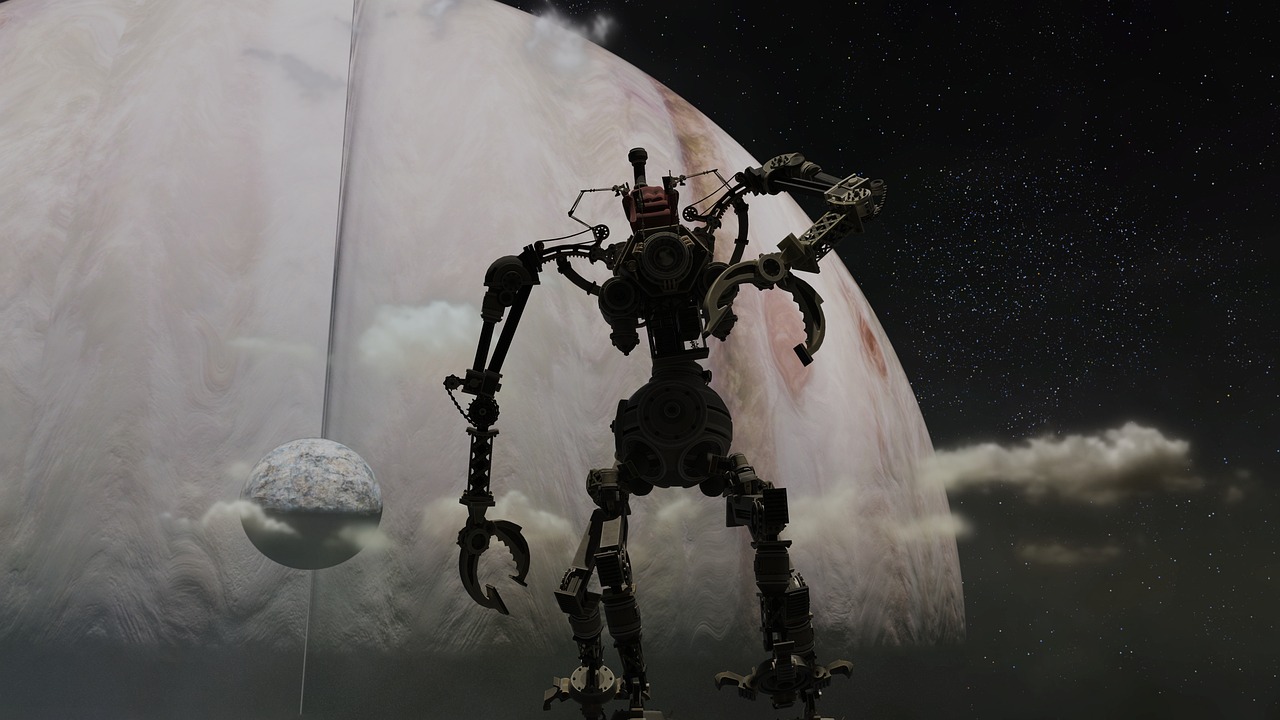Aliens and Politics - A Philosophical Dilemma?
The intersection of extraterrestrial life and political theory is not just a matter of sci-fi fantasies; it opens up a Pandora's box of questions that challenge our very understanding of governance, ethics, and societal structures. Imagine a world where we are not alone in the universe—what implications would that have on our political systems? Would the discovery of aliens force us to reevaluate our core beliefs about leadership and authority? These questions aren't merely hypothetical; they push us to consider the profound impacts of such a revelation on humanity's collective psyche.
Throughout history, the concept of alien life has been a source of both fascination and fear. From ancient civilizations that gazed at the stars and pondered the existence of other beings, to modern-day debates about UFO sightings and government cover-ups, our relationship with the idea of extraterrestrial life has always had a political dimension. The philosophical implications of alien existence could lead to a radical shift in how we view ourselves as a species and our place in the cosmos. Are we the pinnacle of evolution, or just one of many intelligent species scattered across the universe?
Furthermore, the political ramifications of alien life could extend beyond philosophical debates. The very fabric of our political systems could be tested. Imagine if a government were to announce the existence of extraterrestrial beings—how would this affect public trust in institutions? Would political leaders be seen as credible, or would skepticism reign supreme? The potential for alien disclosure could disrupt current political systems in ways we can hardly predict, leading to a crisis of confidence in governance.
As we delve deeper into this topic, we must also consider the ethical dimensions of interacting with extraterrestrial beings. If we were to make contact, what moral responsibilities would we have? Would we treat them as equals, or would our historical patterns of dominance and exploitation resurface? These questions challenge existing ethical frameworks and compel us to rethink our values in a broader context.
In the face of such existential dilemmas, the question remains: how can we prepare for a future where aliens are not just a figment of our imagination but a reality that demands our attention? The discussions surrounding aliens and politics are not just academic; they are a reflection of our hopes, fears, and aspirations as a species. As we stand on the brink of potential discovery, the need for a thoughtful, informed dialogue has never been more pressing.
- What historical perspectives exist on extraterrestrial life?
Various cultures have speculated about alien life, often reflecting their own societal beliefs and fears. Ancient texts and folklore frequently mention beings from the sky, suggesting a long-standing curiosity about the cosmos. - How would alien disclosure impact existing political systems?
The revelation of extraterrestrial life could lead to widespread skepticism towards governments, as citizens may question what else has been hidden from them. - What ethical dilemmas might arise from contact with aliens?
Interactions with extraterrestrial beings could force us to confront our moral responsibilities and redefine our ethical frameworks, particularly regarding issues of equality and rights. - Can the existence of aliens foster global cooperation?
A shared extraterrestrial threat could unite nations, prompting collaborative efforts to face challenges that transcend national borders.

Historical Perspectives on Extraterrestrial Life
Throughout history, the concept of extraterrestrial life has fascinated humanity, transcending cultural boundaries and sparking the imagination of philosophers, scientists, and everyday people alike. From ancient civilizations to modern times, the idea of beings from other worlds has been woven into the fabric of human thought, often reflecting our deepest fears and aspirations. Ancient cultures, such as the Egyptians and the Mayans, looked to the stars with reverence, believing that celestial bodies held the keys to understanding our existence. They often associated these heavenly entities with gods or supernatural forces, hinting at a belief that life could exist beyond our earthly realm.
As we moved into the Middle Ages, the notion of extraterrestrial beings took on a more theological hue. Scholars like Thomas Aquinas debated the existence of life beyond Earth, often framing their arguments within the context of divine creation. They pondered whether God could have populated other worlds, leading to a rich tapestry of philosophical inquiry. The Renaissance, with its thirst for knowledge and discovery, further propelled this dialogue. Thinkers such as Giordano Bruno boldly suggested that the universe was infinite and teeming with life, challenging the geocentric views of the time and laying the groundwork for modern astronomy.
Fast forward to the 19th and 20th centuries, when the advent of technology and the scientific method began to reshape our understanding of the cosmos. The invention of the telescope opened new windows to the universe, allowing astronomers like Galileo and later Carl Sagan to explore the possibility of life on other planets. This period also saw the birth of science fiction, a genre that not only entertained but also provoked thought about the implications of encountering alien civilizations. Works like H.G. Wells' "The War of the Worlds" and Arthur C. Clarke's "2001: A Space Odyssey" offered profound insights into how we might react to the existence of extraterrestrial life, often reflecting societal anxieties about the unknown.
In contemporary times, the search for extraterrestrial intelligence (SETI) has become a serious scientific endeavor, employing advanced technology to listen for signals from distant civilizations. The discovery of exoplanets in the habitable zone of other stars has reignited interest and speculation about life beyond Earth. As we stand on the brink of potential contact, our historical perspectives on extraterrestrial life become increasingly relevant, urging us to reconsider our political and ethical frameworks. Will the existence of aliens unite us in our quest for knowledge, or will it deepen the divides that already exist in our global society?
In summary, the historical perspectives on extraterrestrial life reveal a journey of human thought that is as complex as it is captivating. From ancient myths to modern scientific inquiry, the evolution of our understanding reflects not only our curiosity about the universe but also our quest for meaning in a seemingly infinite cosmos. As we continue to explore the stars, we must also examine how these beliefs and discoveries will shape our political and ethical landscapes in the future.

The Impact of Alien Disclosure on Governance
Imagine waking up one day to the news that aliens exist and that they have been visiting Earth for decades, perhaps even influencing our politics from the shadows. The mere thought of such a revelation sends shivers down the spine of political theorists and everyday citizens alike. The impact of alien disclosure on governance could be profound, shaking the very foundations of our political systems and challenging our understanding of authority, truth, and societal cohesion.
First and foremost, the revelation of extraterrestrial life could lead to a significant crisis of trust in government institutions. For many, the idea that governments may have known about aliens and withheld this information is a betrayal of public trust. If such a disclosure were to occur, the question arises: how can citizens trust their leaders when they have been kept in the dark about such a monumental truth? This could lead to widespread skepticism towards not just the government but also the media and other institutions that are supposed to act as checks on power.
Moreover, the political landscape could shift dramatically. Current political ideologies might be challenged as people grapple with the implications of sharing our planet with intelligent life forms. For instance, the traditional notions of nationalism could be tested. As nations confront the reality of extraterrestrial life, the focus might shift from internal conflicts to a more unified approach against a common "other." This could lead to the formation of new political coalitions and perhaps even a redefinition of borders and alliances.
To further illustrate this, consider the following table that outlines potential impacts of alien disclosure on various aspects of governance:
| Impact Area | Potential Changes |
|---|---|
| Public Trust | Decrease in trust towards government institutions due to perceived secrecy. |
| Nationalism | Shift from nationalistic sentiments to global cooperation against a common extraterrestrial presence. |
| Policy Making | New policies focused on interstellar communication and defense strategies. |
| Ethical Frameworks | Redefinition of ethical considerations regarding life, intelligence, and governance. |
Furthermore, the psychological impact on the public cannot be underestimated. People might react with fear, excitement, or even denial. The government’s response to these emotions will be crucial. If handled poorly, it could lead to civil unrest or panic. Conversely, if the government embraces transparency and engages in open dialogue with the public, it may foster a renewed sense of community and shared purpose. The balance between maintaining order and encouraging open discourse will be a tightrope walk for any governing body in the wake of such a revelation.
In conclusion, the impact of alien disclosure on governance could be both profound and multifaceted. As we ponder the implications of extraterrestrial life, it becomes clear that our political systems, societal norms, and ethical frameworks may need to evolve. The question isn't just about the existence of aliens but about how we, as a society, choose to respond to the reality of our place in the universe. Will we unite in the face of the unknown, or will we fracture under the weight of our fears and uncertainties? Only time will tell.
- What would happen to national borders if aliens were confirmed to exist?
National borders might become less significant as countries unite against a common extraterrestrial presence. - How might public trust in government change after alien disclosure?
Public trust could diminish significantly due to feelings of betrayal over withheld information. - Could alien disclosure lead to new policies?
Yes, new policies could emerge focusing on defense, communication, and ethical considerations regarding extraterrestrial life.

Public Reaction to Alien Disclosure
The prospect of alien disclosure is a concept that has long fascinated humanity, igniting our imagination and raising profound questions about our place in the universe. When the idea of extraterrestrial life is brought to the forefront, public reaction can be as varied as the stars in the sky. Some people may greet the news with excitement, envisioning a future filled with interstellar diplomacy and shared knowledge, while others might respond with fear and skepticism, worrying about the implications of such revelations on our societal norms and security.
Imagine waking up one morning to the news that aliens have been confirmed to exist. How would you feel? Would you be thrilled at the thought of meeting beings from another world, or would you feel a chill run down your spine at the thought of the unknown? The emotional spectrum is wide, and the psychological impact of such a revelation could be profound. Studies in psychology suggest that when faced with unexpected news, people often go through a range of reactions, including disbelief, fear, and eventually acceptance. This phenomenon is not unlike the stages of grief, where individuals must process their feelings and adapt to a new reality.
Moreover, the reaction to alien disclosure could vary significantly based on cultural backgrounds and personal beliefs. For instance, in cultures that emphasize collectivism, the discovery of extraterrestrial life might lead to a stronger sense of unity among people, as they rally together in the face of a shared cosmic reality. Conversely, in more individualistic societies, the reaction might be more fragmented, with different groups interpreting the news through their own ideological lenses. This divergence in responses can lead to a complex tapestry of public opinion, influenced by factors such as media portrayal, political rhetoric, and individual experiences.
To further illustrate the potential public reactions, let's look at some possible categories of responses:
- Excitement and Curiosity: Some individuals may feel a surge of enthusiasm, eager to learn more about the aliens and what they might bring to humanity.
- Fear and Anxiety: Others might react with trepidation, worried about the implications for human safety and the potential for conflict.
- Skepticism: A segment of the population may question the validity of the claims, demanding proof before accepting the existence of extraterrestrial life.
- Philosophical Reflection: Many may take this opportunity to ponder deeper questions about existence, ethics, and our responsibilities as a species.
This diversity of reactions highlights the complexity of human psychology and the societal implications of such a monumental revelation. It also raises questions about how governments and institutions would need to respond to these varied reactions. Would they seek to reassure the public, or would they take a more cautious approach, carefully managing the flow of information to avoid panic? The answers to these questions could shape not only political discourse but also the very fabric of society itself.
Ultimately, the public's response to alien disclosure is not merely a matter of emotional reaction; it is a reflection of our collective consciousness and the values we hold dear. As humans, we have always sought to understand our place in the cosmos, and the possibility of extraterrestrial life challenges us to reconsider our assumptions about existence, governance, and our role in the universe. How we react to such news could very well define the future trajectory of human civilization.
- What are the most common reactions to the idea of alien life? Reactions can range from excitement and curiosity to fear and skepticism, influenced by cultural and individual beliefs.
- How might governments respond to alien disclosure? Governments may seek to reassure the public, manage information carefully, and address concerns about safety and security.
- Could alien disclosure unify or divide society? It could do both; while some may come together in shared curiosity, others may find themselves divided by differing beliefs and fears.
- What ethical questions arise from the discovery of alien life? Ethical considerations could include our responsibilities toward extraterrestrial beings and the moral implications of contact.

Media Influence on Public Perception
The media plays a pivotal role in shaping our understanding of the world around us, and when it comes to the subject of extraterrestrial life, its influence can be both profound and multifaceted. From sensationalized news reports to thought-provoking documentaries, the way aliens are portrayed in the media can significantly affect public perception. Think about it: how many times have you seen a headline screaming about a UFO sighting or an alleged government cover-up? These narratives can ignite curiosity, fear, and even excitement among the public, leading to a wide range of reactions.
Moreover, the representation of aliens in popular culture—through movies, TV shows, and books—creates a framework within which people understand the concept of extraterrestrial life. For instance, films like "Independence Day" or "E.T." offer contrasting views of aliens: one as a formidable threat and the other as a friendly visitor. This dichotomy can lead to polarized opinions about what alien encounters might entail, affecting how society reacts to potential disclosures of alien existence. The media doesn't just report the news; it often creates the narrative that shapes our fears and hopes.
Additionally, social media platforms have transformed how information about aliens circulates. With the rise of viral content, unverified claims can spread like wildfire, often leading to misinformation. A single tweet or post can spark a frenzy, prompting discussions that might not be grounded in reality. This phenomenon raises questions about the responsibility of media outlets and content creators. Are they merely entertainers, or do they have a duty to inform the public accurately? The line between fact and fiction can become blurred, leading to a society that may react irrationally to the idea of alien life.
To illustrate the impact of media on public perception, consider the following table that highlights various media portrayals of aliens and their corresponding public reactions:
| Media Portrayal | Public Reaction |
|---|---|
| UFO Sightings | Increased fear and skepticism towards government transparency |
| Documentaries on Alien Life | Curiosity and interest in scientific exploration |
| Science Fiction Films | Varied reactions, from excitement to anxiety about potential threats |
| Social Media Buzz | Rapid spread of conspiracy theories and misinformation |
Ultimately, the media's influence on public perception of aliens is a double-edged sword. While it has the potential to educate and inform, it can also mislead and incite panic. As we navigate this complex landscape of information, it becomes crucial for consumers of media to approach alien-related content with a critical eye. In a world where facts can be easily distorted, understanding the role of media in shaping our beliefs about extraterrestrial life is more important than ever.
- How does media shape our understanding of aliens?
Media influences our perceptions through sensational reporting, entertainment, and social media narratives, shaping our fears and hopes regarding extraterrestrial life. - What are the consequences of misinformation about aliens?
Misinformation can lead to irrational fears, public panic, and a lack of trust in government institutions, complicating the discourse around potential alien encounters. - Can media portrayals of aliens impact political decisions?
Yes, the way aliens are depicted can influence public opinion and, consequently, political strategies and policies related to national security and space exploration.

Government Secrecy and Alien Knowledge
When we think about government secrecy regarding alien knowledge, it often feels like we’re delving into the realm of conspiracy theories and sci-fi movies. Yet, the implications of such secrecy are profoundly serious and could reshape our understanding of transparency and accountability in governance. Imagine living in a world where your government holds the keys to knowledge about extraterrestrial life, while you remain blissfully unaware. This raises an important question: what are they hiding, and why?
Historically, governments have often operated under a veil of secrecy, especially concerning national security and classified information. However, when it comes to the existence of aliens, the stakes are even higher. If it were to be confirmed that extraterrestrial beings exist, the impact on society could be monumental. It could lead to widespread panic, curiosity, or even a sense of existential dread. The public's reaction would likely depend on how the information is disclosed and the context in which it is presented.
Moreover, the secrecy surrounding alien knowledge could erode public trust in government institutions. If citizens discover that their leaders have withheld critical information about extraterrestrial life, the fallout could be catastrophic. Trust is the cornerstone of any functioning democracy, and once it is broken, it can take years, if not decades, to rebuild. This potential breach of trust could lead to a disconnect between the government and the governed, fostering an environment of skepticism and conspiracy thinking.
One might wonder how this secrecy manifests in practical terms. Governments may engage in the following actions to maintain control over alien-related information:
- Classifying documents: Many documents related to UFO sightings and military encounters with unidentified aerial phenomena are often classified, limiting public access to potentially vital information.
- Controlling narratives: The media is often used as a tool to shape public perception. By controlling what information is shared, governments can influence how the public views the possibility of alien life.
- Discrediting whistleblowers: Individuals who come forward with information about alien encounters may face serious repercussions, discouraging others from speaking out.
In a world where alien life is a possibility, the ethical implications of government secrecy become even more pronounced. Should the public be informed about potential extraterrestrial threats? Or should governments prioritize national security over transparency? These questions lead us into a complex web of ethical considerations that challenge our traditional political frameworks. As we navigate this uncharted territory, we must grapple with the notion that knowledge is power, and with great power comes great responsibility.
Ultimately, the secrecy surrounding alien knowledge is not just about extraterrestrials; it reflects deeper issues within our political systems. It forces us to confront uncomfortable truths about governance, accountability, and the nature of trust in society. As we ponder the existence of aliens, we must also consider the implications of what it means to live in a world where knowledge is withheld, and the truth is obscured.
- Why do governments keep secrets about aliens? Governments may believe that withholding information about extraterrestrial life is necessary for national security and public safety.
- How does secrecy affect public trust? When people feel that their government is not being transparent, it can lead to skepticism and a decline in trust towards political institutions.
- What are the ethical implications of government secrecy? The ethical dilemmas include whether the government has a moral obligation to inform the public about potential extraterrestrial threats.

Ethical Considerations in Alien Encounters
When we dive into the realm of extraterrestrial encounters, we inevitably stumble upon a labyrinth of ethical dilemmas that challenge our very understanding of morality and governance. Imagine a scenario where we make contact with another intelligent species. What would our responsibilities be towards them? Would we treat them with the same respect and dignity that we expect for ourselves, or would our instinctive survival mechanisms kick in, leading us to view them as potential threats? These questions are not just hypothetical; they beckon us to reflect on our values and principles as a society.
One of the primary ethical concerns revolves around the concept of sentience. If we discover that aliens possess self-awareness and the ability to experience suffering, the moral implications are profound. Should we extend the same rights to these beings as we do to humans? This question is reminiscent of historical debates regarding the rights of various marginalized groups on Earth. Just as we have grappled with the moral considerations of slavery, animal rights, and human rights, we would need to reassess our ethical frameworks in light of alien life.
Furthermore, the potential for exploitation looms large in any discussion of alien encounters. History has shown us that when one group encounters another, the temptation to dominate and exploit often rears its ugly head. This raises a critical question: how do we ensure that our interactions with extraterrestrial beings are grounded in respect and equality? Would we be able to resist the urge to exploit their resources or technology for our own gain? The ethical principle of utilitarianism—which advocates for the greatest good for the greatest number—could be put to the test in such a scenario, as we navigate the fine line between benefiting humanity and harming another species.
Moreover, the concept of informed consent becomes increasingly complex when we consider interactions with non-human entities. On Earth, we have established norms for conducting experiments and interactions with living beings, emphasizing the importance of consent. But how do we apply this principle to beings whose language, culture, and understanding of consent may be entirely alien to us? This dilemma highlights the necessity for a robust ethical framework that can adapt to the complexities of inter-species interactions.
In addition to these ethical considerations, we must also confront the implications of cultural exchange. If we were to engage with an alien civilization, what aspects of our culture would we choose to share? Would we promote our values of democracy, freedom, and equality, or would we inadvertently impose our beliefs on them? This raises the question of cultural imperialism and the ethical responsibility we hold in ensuring that any exchange is reciprocal and respectful.
As we ponder these dilemmas, it’s essential to recognize that the conversation surrounding ethics in alien encounters is not merely an academic exercise. It has real-world implications for how we approach our relationships with one another here on Earth. By reflecting on these ethical considerations, we can better prepare ourselves for the prospect of encountering alien life and ensure that our actions align with our highest moral ideals.
- What are the primary ethical concerns regarding alien encounters?
The main concerns include the treatment of sentient beings, potential exploitation, informed consent, and cultural exchange. - How can we ensure respect for extraterrestrial life?
By establishing a robust ethical framework that prioritizes respect, equality, and mutual understanding. - Can we apply human ethical principles to alien life?
While some principles may translate, we must be cautious and adaptable, considering the unique contexts of extraterrestrial beings.

Alien Life and Global Cooperation
The discovery of extraterrestrial life could serve as a powerful catalyst for global cooperation. Imagine a scenario where humanity is faced with undeniable proof of alien existence. This revelation would likely prompt nations to reassess their priorities and unite in ways we have never seen before. The old rivalries and conflicts that often dominate the international stage might take a backseat to a more pressing concern: the need for a collective response to an unknown entity beyond our planet. This is not just a fanciful notion; it's a potential reality that could redefine how we view governance and international relations.
Historically, humanity has come together in the face of shared threats. For instance, during the Cold War, the fear of nuclear annihilation led to various arms control agreements and diplomatic negotiations. Similarly, the existence of a common extraterrestrial threat could foster a sense of unity among nations, leading to new forms of governance and collective security measures. The prospect of cooperating with former adversaries to address challenges posed by alien life could pave the way for unprecedented diplomatic breakthroughs.
However, the idea of global cooperation in the face of extraterrestrial life is not without its complexities. Nations may struggle with conflicting interests, differing ideologies, and historical grievances. For instance, how might countries with strained relationships, such as the United States and North Korea, collaborate on issues related to alien encounters? The dynamics of international politics could shift dramatically, as nations would need to navigate a new landscape where survival might depend on collaboration rather than competition.
Furthermore, the concept of shared governance could emerge. Imagine a world where a global council is formed to address issues related to extraterrestrial life. This council could consist of representatives from various nations, working together to create policies and strategies for engaging with alien civilizations. Such a body could also serve as a platform for addressing ethical considerations, ensuring that humanity's interactions with extraterrestrial beings are guided by a sense of responsibility and respect.
In addition to governance, the implications for scientific collaboration could be profound. The quest to understand alien life would necessitate a pooling of resources, knowledge, and expertise from around the globe. Scientists from different countries could collaborate on research initiatives, sharing data and insights that might lead to groundbreaking discoveries. This spirit of cooperation could extend beyond the scientific community, fostering a cultural exchange that enriches our understanding of both humanity and the cosmos.
However, we must also consider the potential for conflict that could arise from this new paradigm. As nations come together to address the implications of alien life, existing geopolitical tensions might be exacerbated. For instance, competition for resources—such as advanced technology or knowledge gained from extraterrestrial encounters—could lead to disputes. The challenge will be finding a balance between cooperation and competition, ensuring that the drive for progress does not overshadow the need for peace and collaboration.
Ultimately, the discovery of alien life could serve as a mirror reflecting our own humanity. It could challenge us to confront our differences and work towards a common goal. While the road to global cooperation may be fraught with challenges, the potential benefits—ranging from enhanced security to scientific advancements—are too significant to ignore. As we ponder the possibilities, one thing is clear: the future of humanity may very well depend on our ability to unite in the face of the unknown.
- What would be the first step after confirming extraterrestrial life?
The first step would likely involve global discussions among world leaders to establish a unified approach to the situation. - How can nations ensure cooperation in the face of potential conflict?
Establishing international treaties and frameworks for communication and collaboration will be essential in mitigating conflicts. - What role would scientists play in this new era of cooperation?
Scientists would lead the charge in research and understanding, providing the necessary knowledge to inform policy decisions. - Can cultural exchanges help in fostering global cooperation?
Absolutely! Cultural exchanges can promote understanding and empathy, which are crucial for collaboration.

Shared Threats and Unity
The notion of extraterrestrial life has long been a subject of fascination and speculation. But what if we were to discover that we are not alone in the universe? The implications of such a revelation could be profound, especially when it comes to the concept of global unity. Imagine a scenario where humanity faces a shared threat from an alien civilization. In this context, the potential for unity among nations could shift from a distant dream to an urgent necessity. Just as nations have come together during global crises, like the COVID-19 pandemic, the existence of extraterrestrial life could serve as a rallying point for collective action.
When faced with a common enemy, historical precedent suggests that nations often set aside their differences. The idea of "us against them" could foster a newfound solidarity among countries that have historically been at odds. For instance, during World War II, countries that were once rivals united against the Axis powers, leading to a level of cooperation that reshaped the world order. The potential discovery of alien life could ignite similar sentiments, compelling nations to collaborate on defense strategies, scientific research, and even humanitarian efforts aimed at understanding and addressing the challenges posed by extraterrestrial beings.
In this hypothetical scenario, we might witness the formation of new alliances and coalitions. Countries might prioritize a unified front over nationalistic agendas, leading to the establishment of international governing bodies dedicated to extraterrestrial affairs. This could be akin to the formation of NATO, where member states agree to mutual defense in the face of external threats. Such alliances could foster a sense of global citizenship, transcending borders and cultural differences. In a world where the stakes are as high as potential alien encounters, the benefits of unity could outweigh the allure of isolationism.
However, it is essential to acknowledge the complexity of human nature. While the idea of shared threats fostering unity is compelling, we must also consider the potential for conflict. The fear of the unknown often breeds suspicion and paranoia. Nations might compete for resources or technological advantages in the wake of an alien discovery. The race to understand and potentially harness extraterrestrial technology could lead to new forms of rivalry, reminiscent of the Cold War era. Thus, the challenge lies in balancing the instinct for cooperation with the inherent competitive nature of humanity.
To navigate these complexities, it would be critical for global leaders to prioritize diplomacy and open communication. Establishing frameworks for international collaboration, perhaps through organizations like the United Nations, could help mitigate tensions and foster a spirit of cooperation. Education and public discourse would also play vital roles in shaping perceptions of extraterrestrial life, emphasizing the importance of unity over division. After all, if we are to face the cosmos together, we must first learn to work together here on Earth.
In conclusion, the discovery of extraterrestrial life has the potential to redefine our understanding of global unity. While it could serve as a catalyst for unprecedented cooperation among nations, it also poses challenges that must be addressed with foresight and wisdom. The question remains: can humanity rise to the occasion and embrace the unity that shared threats demand? Only time will tell, but one thing is certain—our response to the unknown will shape the future of our planet.
- What are the potential benefits of global unity in the face of alien threats? Global unity could lead to enhanced security, shared knowledge, and collaborative scientific advancements, making humanity more resilient against external challenges.
- Could the existence of aliens exacerbate geopolitical tensions? Yes, the fear of competition for resources and technology could lead to increased tensions and conflicts between nations.
- How can nations prepare for potential extraterrestrial encounters? Nations can prepare by fostering international cooperation, enhancing diplomatic channels, and investing in scientific research to better understand the cosmos.
- What role does media play in shaping public perception of aliens? Media influences public opinion by framing narratives around extraterrestrial life, which can either promote fear or encourage curiosity and unity.

Potential for Conflict
When we think about the discovery of extraterrestrial life, it’s easy to imagine a world united in awe and curiosity. However, the reality could be far more complex and fraught with tension. The mere existence of alien beings might not usher in an era of peace and collaboration; rather, it could exacerbate existing geopolitical conflicts and ignite new ones. Imagine nations scrambling to assert dominance over technology, resources, and even ideological narratives that arise from this groundbreaking revelation. The stakes would be incredibly high, and the potential for conflict could be just as explosive as the discovery itself.
One of the main issues at play is the competition for resources. If extraterrestrial life were discovered to possess advanced technology or valuable resources, countries might engage in a race to acquire these assets. This scenario could lead to a modern-day gold rush, where nations prioritize their interests over cooperative exploration. For example, if an alien spacecraft were found to contain precious materials, nations might react similarly to how they did during the colonial era—viewing it as a territory to conquer rather than a phenomenon to study collaboratively.
Moreover, the ideological implications of alien life could also fuel conflict. Different countries have varying beliefs about the universe and humanity’s place within it. Some might see extraterrestrial beings as a threat to their cultural or religious narratives, leading to a backlash against the scientific community or international organizations advocating for peaceful engagement. This clash of ideologies could spark protests, political unrest, and even military posturing as nations attempt to defend their worldviews against perceived alien threats.
Additionally, the potential for miscommunication and misunderstanding cannot be overlooked. Just as human history is rife with conflicts born from misinterpretation, the same could happen on a cosmic scale. If aliens were to make contact, the way they communicate—be it through language, symbols, or even telepathy—could be fundamentally different from human interaction. Such differences might lead to diplomatic faux pas, escalating tensions between nations as they grapple with the implications of these encounters.
Furthermore, the question of military readiness looms large. Governments around the world may feel compelled to bolster their military capabilities in response to the unknown. This arms race could lead to heightened tensions, as countries prepare for potential threats from beyond our planet rather than focusing on resolving terrestrial conflicts. The fear of the unknown often breeds paranoia, and in the realm of international relations, this can result in a precarious situation where nations are on high alert, ready to respond to what they perceive as an existential threat.
In summary, the discovery of extraterrestrial life has the potential to spark a myriad of conflicts, from resource competition to ideological clashes and military escalations. As thrilling as the prospect of alien contact may be, we must also consider the darker implications that could arise. The path to understanding and cooperation may be fraught with challenges, and it is crucial for global leaders to approach this possibility with a mindset geared toward diplomacy and peace rather than conflict and division.
- What are the main causes of conflict regarding extraterrestrial life?
The main causes include competition for resources, ideological differences, miscommunication, and military readiness. - How can nations prepare for potential alien contact?
Nations can prepare by fostering international cooperation, investing in diplomatic channels, and promoting peaceful scientific exploration. - What role does media play in shaping public perception of alien life?
Media can influence narratives, often sensationalizing the idea of aliens, which can lead to increased fear or excitement among the public.
Frequently Asked Questions
- What are the historical perspectives on extraterrestrial life?
Throughout history, various cultures have held different beliefs about extraterrestrial life. Some ancient civilizations viewed the stars as a home for gods or otherworldly beings, while others speculated about life beyond Earth through mythology and folklore. In contemporary times, scientific discoveries and advancements in technology have shifted perspectives, leading to a more open-minded approach to the possibility of alien life.
- How could the disclosure of aliens impact governance?
The revelation of extraterrestrial beings could shake the very foundations of our political systems. It might lead to a crisis of trust in government institutions, as people could question why such information was kept secret. This could prompt calls for greater transparency and accountability, reshaping the relationship between citizens and their governments.
- What is the public's reaction to the idea of alien existence?
Public reaction to the possibility of aliens varies widely, ranging from excitement and curiosity to fear and skepticism. Some individuals may embrace the idea, seeing it as an opportunity for humanity to unite, while others may experience anxiety about the implications for our safety and security. This psychological response can significantly influence political stability and policymaking.
- How does media influence public perception of aliens?
The media plays a crucial role in shaping narratives about aliens and politics. Through documentaries, news reports, and entertainment, the portrayal of extraterrestrial life can either spark interest and curiosity or fuel paranoia and distrust. This, in turn, affects public opinion and can sway political discourse on the subject.
- What ethical considerations arise from potential alien encounters?
When contemplating interactions with extraterrestrial beings, numerous ethical dilemmas emerge. These include questions about rights, responsibilities, and the moral implications of our actions. Such encounters could challenge existing ethical frameworks and force us to redefine our understanding of morality in a broader, intergalactic context.
- Could the discovery of alien life foster global cooperation?
Yes, the existence of extraterrestrial life could serve as a unifying factor among nations, encouraging collaboration on a global scale. Facing a shared challenge might lead to new political alliances and collective security measures, as countries work together to address the potential implications of alien life.
- Is there a risk of conflict due to the discovery of aliens?
Absolutely. While the discovery of alien life could promote unity, it could also exacerbate existing geopolitical tensions. Nations may compete for resources, territory, or technological advantages related to extraterrestrial encounters, leading to new forms of conflict and ideological disputes.



















